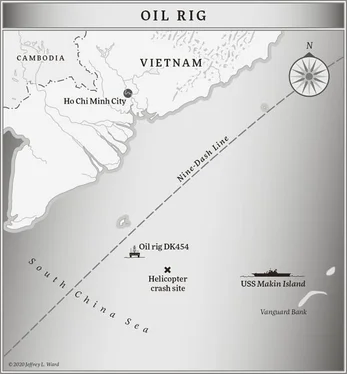“So,” Ryan said. “Let’s say these sounds are coming from a DISSUB. The Chinese are homing in on a signal thirty miles away from where Dr. Moon made her recording? Either the damaged sub traveled, or they’re looking in the wrong place.”
Dustin Fullmer moved his hand like he was going to raise it but changed his mind.
“Let’s have it,” Ryan said.
“Well, sir,” Fullmer said. “I’m not a hundred percent sure of Chinese technology, but what if the DISSUB deployed a submarine rescue buoy? If the cable detached, it could have been carried under the ice and didn’t pop to the surface until it was thirty miles away.”
Ryan glanced at Forestall.
“I suppose that could be the case,” Forestall said.
“Would the buoy have GPS of the original deployment?” Ryan asked.
“I’m not sure about Chinese design,” Forestall said. “The buoys are designed to deploy automatically if the timers aren’t reset periodically, in case they’re unreachable in an accident. The Russians kept having accidental deployments, so they welded many of theirs in place.”
“Okay,” Ryan said, giving Fullmer an attaboy nod. He scribbled something in his notepad and then looked up at Burgess. “Who do we have up north, Bob?”
“The Navy’s biennial ICEX ended a little over a week ago,” Burgess said. “Two subs took part. The Connecticut was headed home, already abeam the San Juan Islands by the time we turned her around. But SSN 789—the Indiana —is still under the ice. We don’t have contact with her for the moment, but we’re sending ELF signals for her to make contact when she’s able to receive. I imagine she’s shadowing a Russian submarine. They would have come to lurk around the edges of our ICEX training. If need be, we can send someone up with Deep Siren. Find a lead in the ice and get a message to them that way.”
Raytheon’s Deep Siren was essentially a low-frequency acoustic tactical paging system to communicate underwater. It had proven itself many times over during several ICEX scenarios. Moving ice was problematic, but as long as there was open water, messages could be sent to the sub. “In addition to the Indiana , the USCG icebreaker Healy is also present,” Burgess added. “We’ve been in contact and they are moving to investigate the point of this coded signal’s origin.”
“Very well,” Ryan said. “The ice makes it problematic …”
Forestall nodded.
“It does indeed, sir,” Burgess said. “Surface ships are a no go, other than the Healy . And with this many Chinese, U.S., and, surely, Russian submarines playing cat and mouse the chances of someone bumping rises sharply.”
Ryan shook his finger. “No bumping.”
“Roger that, Mr. President.”
“Have your experts keep playing with the sound file and that coded signal,” Ryan said, still tapping the desk with his pencil.
“Of course, sir,” Forestall said.
“So,” Ryan said. “Dr. Moon is from Alaska?”
“Yes, Mr. President,” Forestall said. “Her record says she’s from a small village on the Arctic. Point Hope.”
“Point Hope.” Ryan gave a sad shake of his head. “Interesting.”
“It’s in the top corner of the state,” Forestall said. “On the northwest coast.”
“I’m familiar with Point Hope,” Ryan said. “And some of you likely read about it in college. Shortly after World War Two, some well-meaning but poorly informed folks at the Atomic Energy Commission were trying to come up with peacetime uses for the A-bomb. In their infinite governmental wisdom, somebody decided we should detonate five nuclear bombs a little south of that village where Dr. Moon is from to build a new harbor … in an area that stayed covered in ice more than half of the year. The plan was nixed, but it’s no wonder she doesn’t trust the government. I’m sure she grew up hearing stories about Project Chariot. You work for the government as long as I have, you learn some conspiracies deserve a little extra credence. Given the total of what’s going on, there is a strong probability that the PLAN Submarine Force is launching a rescue mission.”
“Agreed,” Burgess said.
“Very well,” Ryan said. “I’ll leave the how and how many up to you. But I’d like to be kept informed. Where exactly is the Healy right now?”
The Coast Guard vessel Healy was one of only two functional icebreakers in the U.S. military inventory. China also had two. Russia had over forty.
Commander Forestall tapped a query into his tablet, waited a moment, then said, “The Healy is patrolling north of Kaktovik, Alaska—an old DEW Line station.”
DEW Line was a series of Distant Early Warning radar sites, meant to keep tabs on the Soviet Bear during the Cold War. Some three hundred miles east of Point Barrow, the Inupiat village of Kaktovik was on the northern edge of the Arctic National Wildlife Refuge. It now served as a hub for scientific research on climate change and a thriving tourist destination for watching polar bears that came to eat on the boneyard from the village’s yearly harvest of bowhead whales.
Ryan stood. The others were already standing, but van Damm got to his feet as well.
“Who’s Healy ’s skipper?”
Forestall glanced at his tablet again. “Captain Jay Rapoza.”
Ryan picked up the pencil again, thinking, then tossed it back to the center of his desk.
“And he’s heading for the source of this coded signal?”
“Correct,” Burgess said.
“And that will take him near the place were Dr. Moon heard her sounds?”
Burgess glanced at Forestall.
“Right over the top of it, Mr. President.”
“Bob, get in touch with Rapoza’s chain of command and make sure everyone stays in the loop as things develop.”
“Yes, sir,” the SecDef said.
“Robbie,” Ryan said, causing Forestall to turn. “There’s one more thing I’d like you to facilitate for me.”
20
John Clark marked the police minders as soon as he boarded the aircraft. Both were Han Chinese men in their forties, seated three rows behind him on either side of the aisle. They read magazines, looking up periodically with feigned disinterest. The one on the right had thinning hair and a long, horselike face. He was dressed like a businessman coming home from a conference, open-collared white shirt, rumpled suit, an overcoat he kept in his lap like a blanket. He talked on his phone a lot—or pretended to. The other was slightly doughy with a blue ball cap and puffy blue ski jacket over a corduroy sport coat that looked too tight to button. Clark noted Horse Face’s shoe that stuck half out in the aisle. It was well worn, sturdy, and didn’t quite match the business suit. The Uyghurs who’d boarded in front of Clark recognized the minders for what they were as well, and leaned slightly away when they shuffled past, as if the men were contagious.
Clark had the entire row to himself. The China Southern Airlines flight was only around half full, but most of the passengers were Uyghur men. None of them wanted to risk being seen chatting with a foreigner by the two police minders.
The steady hiss of air flowing across the fuselage of the shabby but serviceable Airbus changed to a burbling roar as the pilots deployed flaps and slowed the plane in preparation for landing. Clark’s ears popped, alerting him to the aircraft’s descent. He hated airports, and didn’t particularly enjoy being crammed into a flying metal tube. But he wasn’t apprehensive about flying itself. At best, he was ambivalent. For him, slipping the surly bonds of earth was simply a means to an end. Some found the idea of flying a romantic notion. Good for them. Clark understood, a little.
Читать дальше











![Александр Ирвин - Tom Clancy’s The Division 2. Фальшивый рассвет [litres]](/books/417744/aleksandr-irvin-tom-clancy-s-the-division-2-falsh-thumb.webp)
